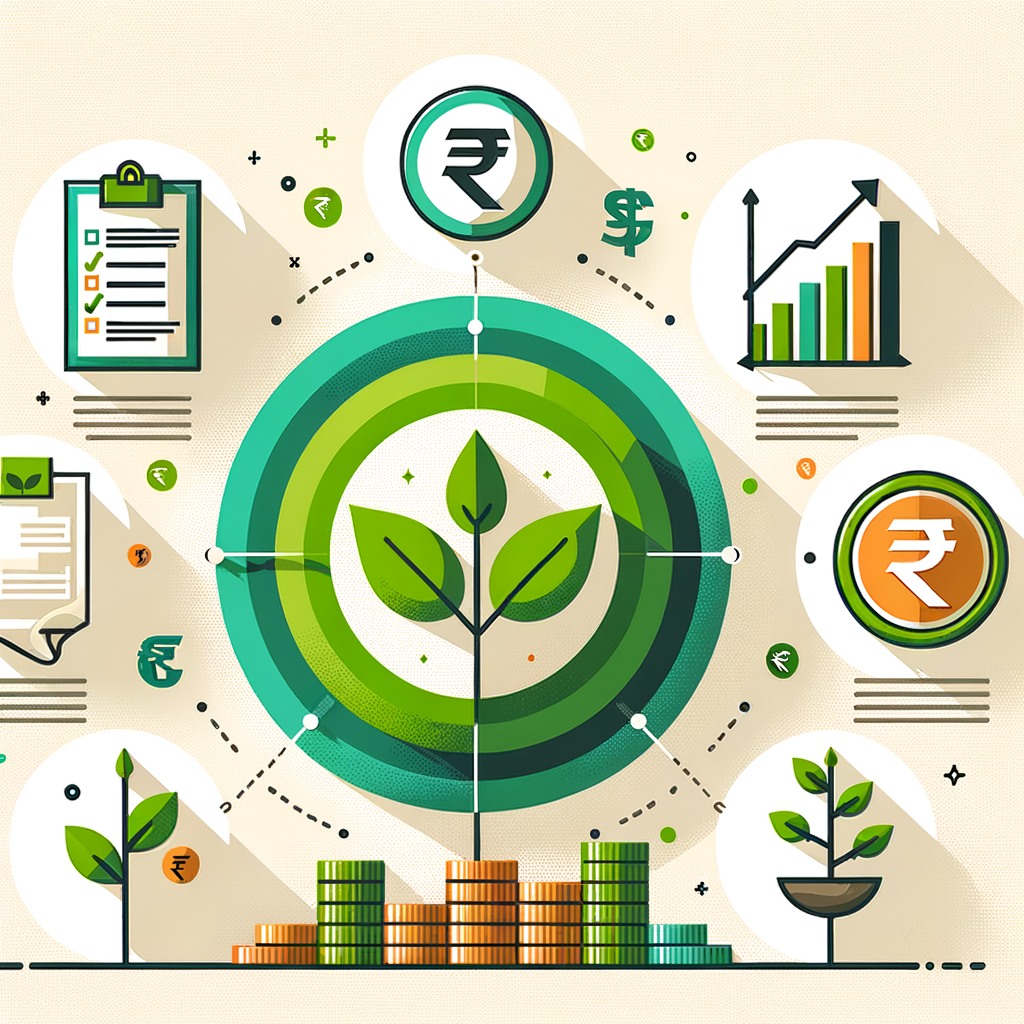How to Start an Organic Food Business in India: A Step-by-Step Guide for 2024
The Indian organic food market is projected to reach over $2.6 billion by 2026, growing at a remarkable CAGR of over 21%. If you’re looking for a detailed guide on how to start an organic food business, you’ve come to the right place. The massive cultural shift towards healthier, sustainable lifestyles presents a golden opportunity for aspiring entrepreneurs to build a profitable and purpose-driven venture. While the potential is immense, navigating the journey requires a clear plan. At TaxRobo, we specialize in helping entrepreneurs handle the financial and legal complexities, allowing them to focus on what they do best. This guide will walk you through everything from understanding market trends and choosing a business model to registering your company and launching your products successfully.
Why Now? Unpacking the Organic Food Market Trends India
Understanding the current market is the first step to validating your business idea. The demand for organic products isn’t just a fleeting fad; it’s a fundamental change in consumer behaviour. The current organic food market trends India are driven by several powerful factors that make this the perfect time to enter the industry.
Firstly, there is a significant increase in consumer awareness regarding health, wellness, and food safety. The recent global health crisis has made people more conscious about what they eat, leading them to seek out food that is free from pesticides, chemicals, and artificial additives. Secondly, rising disposable incomes in urban and semi-urban areas mean more people are willing to pay a premium for high-quality, certified organic products. They see it not as an expense, but as an investment in their long-term health. Finally, the Indian government is actively promoting organic farming through various schemes and initiatives like the National Programme for Organic Production (NPOP) and Paramparagat Krishi Vikas Yojana (PKVY). This support system helps create a more robust supply chain and lends credibility to the entire sector, making it an attractive field for new businesses.
Step 1: Choosing Your Path – Top Organic Food Business Ideas India
Once you’re convinced about the market potential, the next step is to decide on your business model. The organic food industry is vast, offering multiple entry points depending on your capital, expertise, and target audience. Here are some of the top organic food business ideas India to consider:
- Organic Farming: This is the foundation of the supply chain. You can cultivate organic fruits, vegetables, grains, or spices and sell your produce directly to consumers (D2C) through farm stands, local markets, or to other businesses (B2B) like restaurants and retailers. While it requires land and agricultural knowledge, it gives you complete control over product quality.
- Online Organic Store (E-commerce): With lower overhead costs than a physical store, an e-commerce platform allows you to reach a nationwide audience. You can use platforms like Shopify or WooCommerce to set up your store quickly or build a custom website for a unique brand experience. This model thrives on excellent logistics and digital marketing.
- Physical Retail Store: A brick-and-mortar store builds a high level of trust and allows customers to see and feel the products. It can serve as a community hub for health-conscious individuals. However, it requires significant investment in real estate, inventory, and staffing.
- Subscription Box Service: This model offers customers a curated box of organic goodies delivered to their doorstep weekly or monthly. It creates a predictable, recurring revenue stream and fosters strong customer loyalty. Success depends on variety, quality, and a seamless delivery experience.
- Organic Cafe or Restaurant: If you have a passion for food and hospitality, an organic cafe can be a high-margin venture. This is capital-intensive and requires expertise in culinary arts and restaurant management, but it directly showcases the benefits of organic ingredients to customers.
- Value-added Organic Products: This involves processing raw organic ingredients into products with a longer shelf life. Think organic jams, pickles, sauces, ready-to-eat snacks, cold-pressed juices, or spice mixes. This allows for better branding, higher profit margins, and wider distribution possibilities.
Step 2: The Legal Roadmap for Starting an Organic Food Business in India
This is the most critical stage, where you lay the legal foundation for your business. Getting the paperwork right from the start saves you from future penalties and legal hurdles. Here’s a detailed breakdown of the legal requirements for starting organic food business in India.
Choose the Right Business Structure
The legal structure of your business impacts everything from your liability and taxes to your ability to raise funds, making Choosing the Right Legal Structure for Your Business a critical first step. Here are the common options:
| Business Structure | Key Features | Best For |
|---|---|---|
| Sole Proprietorship | Owned and run by one person. Easy and inexpensive to set up. Unlimited personal liability. | Individuals starting a very small-scale business, like a local market stall. |
| Partnership Firm | Owned by two or more partners. Shared profits and liabilities. Relatively easy to start. | Two or more people starting a business together with a formal partnership deed. |
| Limited Liability Partnership (LLP) | A hybrid structure offering the flexibility of a partnership with the benefit of limited liability. | Small to medium-sized businesses that want to separate personal assets from business liabilities. |
| Private Limited Company | A separate legal entity from its owners. Limited liability, easier to raise funds, and higher compliance. | Startups planning to scale, seek investment, or build a large, credible brand. |
Confused about which structure is right for you? TaxRobo’s experts can help you decide. TaxRobo Company Registration Service
Obtain Crucial Licenses and Registrations
Operating a food business in India requires strict adherence to food safety and tax regulations.
- FSSAI License: The Food Safety and Standards Authority of India (FSSAI) license is mandatory for any food business. It ensures that your products are safe for consumption. There are three types:
- Basic Registration: For small businesses with an annual turnover of up to ₹12 lakh.
- State License: For mid-sized businesses with a turnover between ₹12 lakh and ₹20 crore.
- Central License: For large businesses with a turnover above ₹20 crore, as well as for importers, exporters, and e-commerce operators selling across states.
You can apply for your license through the official FSSAI (FOSCOS) portal.
- GST Registration: Goods and Services Tax (GST) registration is mandatory if your annual turnover from selling goods exceeds ₹40 lakh (₹20 lakh for some special category states). It is also compulsory for any business selling products on e-commerce platforms like Amazon or Flipkart, regardless of turnover. Understanding GST is crucial for proper invoicing and pricing; our Ultimate Guide to GST Registration for Small Businesses can help. You can register on the official GST Portal.
- Other Licenses: Depending on your business model, you may also need:
- Shop & Establishment Act License: Required for any physical store or commercial establishment.
- Trade License: Issued by the local municipal corporation.
- Import Export Code (IEC): Necessary if you plan to import or export organic products.
Get Your Organic Certification
To legally label and sell your products as “organic,” you need a valid certification. This is non-negotiable as it builds consumer trust and differentiates you from conventional products.
- NPOP (National Programme for Organic Production): This is India’s premier organic certification standard, managed by APEDA. The ‘India Organic’ seal under NPOP is recognized as equivalent to the standards of the European Union and Switzerland, making it essential for exports. You can find more details on the APEDA’s NPOP page.
- PGS-India (Participatory Guarantee System): This is an alternative certification process that focuses on quality assurance through peer reviews and collective participation. It is a more affordable and accessible system for small farmers and businesses targeting the domestic market.
Step 3: Sourcing, Supply Chain, and Operations
With the legal framework in place, your focus shifts to the practical aspects of running the business. An efficient supply chain is the backbone of any successful organic food venture.
- Finding Certified Organic Suppliers: Your product quality is only as good as your raw materials. It’s crucial to partner with farmers or Farmer Producer Organizations (FPOs) who hold valid NPOP or PGS-India certifications. You can connect with them at agricultural fairs, through APEDA’s database, or via B2B platforms dedicated to organic produce. Always verify their certification documents.
- Logistics & Storage: Organic products are perishable and free from artificial preservatives. This makes proper logistics and storage critical. You may need to invest in cold storage facilities or refrigerated transport to maintain the freshness and nutritional integrity of your products, especially for fruits, vegetables, and dairy.
- Packaging: Your packaging should reflect your brand’s ethos. Consumers of organic products are often environmentally conscious. Opt for eco-friendly and sustainable packaging materials like glass jars, recycled paper, jute bags, or biodegradable plastics. Your packaging is a powerful marketing tool that should communicate your brand’s commitment to health and the planet.
Step 4: Branding and Marketing – How to Launch Organic Food Products in India
Knowing how to launch organic food products in India effectively is just as important as having a great product. Your marketing strategy should be authentic and aimed at building a loyal community around your brand.
- Build a Strong Brand Story: People don’t just buy products; they buy stories. What is your “why”? Are you a third-generation farmer passionate about soil health? Did a personal health journey inspire you? Share your mission and values. Authenticity builds a deep connection with customers that goes beyond price. As you build this unique identity, it is vital to Secure Your Brand’s Future Trademark Your Brand – Registration, Benefits & The Cost of Neglect.
- Dominate Digital Marketing:
- Social Media: Platforms like Instagram and Facebook are visual and perfect for food products. Post high-quality images of your products, share behind-the-scenes content from your farm or kitchen, run contests, and post user-generated content.
- Content Marketing: Start a blog or a YouTube channel. Create valuable content around topics like “Benefits of an Organic Diet,” “Easy Recipes with Organic Ingredients,” or “How to Read Food Labels.” This positions you as an expert and improves your SEO.
- Utilize Offline Marketing:
- Farmers’ Markets & Expos: These are excellent places to offer samples, get direct customer feedback, and build a local following.
- Local Community Events: Sponsoring or participating in local health and wellness events can increase brand visibility.
- Collaborate and Partner:
- Influencer Marketing: Partner with health coaches, nutritionists, fitness influencers, and food bloggers. Their endorsement can lend immense credibility to your brand.
- Chef Collaborations: Work with local chefs and restaurants to feature your organic ingredients on their menus.
Conclusion
The path to building a thriving organic food business is filled with exciting opportunities and unique challenges. By following this structured approach, your dream of how to start an organic food business can become a successful reality. The key is to start with a solid plan: identify your niche, understand the market, meticulously handle all legal formalities like company registration, FSSAI licensing, and GST compliance, build a robust supply chain, and create a brand that resonates with health-conscious consumers.
Navigating the legal and financial landscape can be challenging. Let TaxRobo be your trusted partner. From company registration to GST filing and accounting, we handle the complexities so you can focus on growing your business. Get in touch with us today!
Frequently Asked Questions (FAQs)
1. What is the minimum investment for starting an organic food business in India?
The investment varies greatly depending on your business model. An online-only store can be started with an initial investment of ₹50,000 to ₹2 lakh, covering costs for website development, initial inventory, FSSAI/GST registration, and digital marketing. A physical retail store or a small café would require a much larger investment, often ranging from ₹10 lakh to ₹30 lakh or more, due to expenses like rent, interior setup, heavy inventory, and staff salaries.
2. Is GST mandatory for a small organic food business?
GST registration is mandatory for your business if your annual turnover from selling goods exceeds ₹40 lakh (this limit is ₹20 lakh for some special category states like those in the North-East). However, if you plan to sell your products on any e-commerce platform (e.g., Amazon, Flipkart, or even your own website with a payment gateway), you must register for GST regardless of your turnover.
3. Can I sell organic products without an FSSAI license?
No. It is illegal to sell any food product in India without a valid FSSAI license or registration. The FSSAI license is a legal requirement for any entity involved in the manufacturing, processing, storage, distribution, or sale of food. Operating without it can lead to severe penalties, including fines and imprisonment.
4. What’s the difference between NPOP and PGS-India certification?
NPOP (National Programme for Organic Production) is a third-party certification system recognized internationally. It is mandatory if you plan to export your organic products and use the “India Organic” logo. It involves inspection by an accredited agency. PGS-India (Participatory Guarantee System) is a peer-reviewed, community-based system. It is more affordable and less documentation-heavy, making it ideal for small-scale farmers and businesses that primarily target the domestic Indian market. Your choice depends on your scale and target audience.




This is exactly the kind of post I was looking for. Easy to understand, well-written, and straight to the point. Keep up the great work—you’re helping a lot of people!
Greetings from Ohio! I’m bored to tears at work so I decided to check out your blog on my iphone during lunch break. I really like the info you present here and can’t wait to take a look when I get home. I’m shocked at how fast your blog loaded on my phone .. I’m not even using WIFI, just 3G .. Anyways, awesome site!
Some genuinely interesting points you have written.Aided me a lot, just what I was looking for : D.
Thank you for the sensible critique. Me & my neighbor were just preparing to do a little research on this. We got a grab a book from our local library but I think I learned more from this post. I’m very glad to see such magnificent info being shared freely out there.
Wonderful website you have here but I was wanting to know if you knew of any community forums that cover the same topics talked about in this article? I’d really love to be a part of group where I can get responses from other knowledgeable people that share the same interest. If you have any suggestions, please let me know. Many thanks!
Hmm it looks like your blog ate my first comment (it was extremely long) so I guess I’ll just sum it up what I had written and say, I’m thoroughly enjoying your blog. I as well am an aspiring blog writer but I’m still new to the whole thing. Do you have any helpful hints for first-time blog writers? I’d definitely appreciate it.
I appreciate, cause I found exactly what I was looking for. You have ended my four day long hunt! God Bless you man. Have a great day. Bye
Hey there just wanted to give you a brief heads up and let you know a few of the images aren’t loading correctly. I’m not sure why but I think its a linking issue. I’ve tried it in two different internet browsers and both show the same results.
Hi there this is kind of of off topic but I was wanting to know if blogs use WYSIWYG editors or if you have to manually code with HTML. I’m starting a blog soon but have no coding expertise so I wanted to get advice from someone with experience. Any help would be greatly appreciated!
Thank you for the sensible critique. Me & my neighbor were just preparing to do some research on this. We got a grab a book from our local library but I think I learned more from this post. I am very glad to see such magnificent info being shared freely out there.
I know this if off topic but I’m looking into starting my own blog and was curious what all is needed to get setup? I’m assuming having a blog like yours would cost a pretty penny? I’m not very internet smart so I’m not 100 certain. Any suggestions or advice would be greatly appreciated. Appreciate it
As a Newbie, I am always exploring online for articles that can help me. Thank you